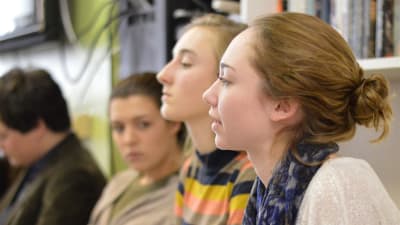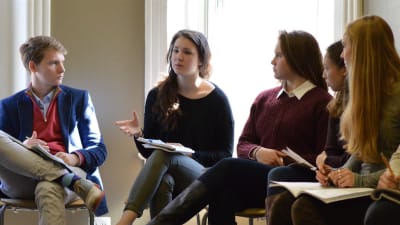White House Speechwriters deliver Master Class
It is rare to have the best in the world critique your work. But that’s just what our students received this week in our speechwriting/first amendment case study. Our featured guests, Lissa Muscatine and Megan Rooney, are seasoned White House and State Department speechwriters who have written some of the most famous American speeches in the last 25 years.
We started on Monday with a visit from Ms. Muscatine, 2013’s “Golden Mug” award winner. (The award, given by graduates, goes to the guest speaker who has made the biggest impact on graduates’ lives.) Muscatine was Hillary Clinton’s top speechwriter for two decades and is the author of Clinton’s most famous speech, the 1995 “Women’s Rights are Human Rights and Human Rights and Women’s Rights” address to the Beijing UN Conference on Women (click here to see the speech) and Clinton’s 2008 Democratic National Convention speech (click here to see the speech), among many others. She told “war stories” from her long career (watch a version of one here and read about her relationship with Clinton here) and then gave practical advice on how to write a great speech: for example, know your audience, know the type of speech you are writing, don’t use many adjectives or adverbs, and violate the rules of grammar if it makes the rhetoric stronger.
She then introduced a challenging assignment, which you can download here. She asked the students to imagine a college student association has invited the French “comedian” Dieudonné to perform. Dieudonné is a lightning rod; many view him as overtly anti-Semitic and homophobic, though many of his fans say he is merely anti-establishment. Some also see parallels between his often-reviled “satire” and Charlie Hebdo’s often-praised “satire,” and wonder about hypocrisy. (You can catch up on the controversy here, here, and here.) In the hypothetical scenario, the college’s president has decided to cancel the event, and must make a speech explaining why; meanwhile, the student body president must make a speech condemning the decision.
In groups of four (aided by rotating small group discussions on the University of Pennsylvania “Water Buffalo” case, a clip–translated by SEGL French teacher Mairéad O’Grady–of an actual Dieudonné performance, and Snyder v. Phelps) the students authored three-minute speeches. This was also their first intense group work of the term–no easy task for students who are often the dominant voice in similar work at home.
On Friday, Ms. Muscatine returned with her speechwriting protege, Megan Rooney, who now writes speeches for President Obama and other White House leaders. (In fact, Ms. Rooney was five minutes late because she was authoring the President’s remarks for Attorney General Eric Holder’s farewell the next day.) Their Master Class is now an SEGL tradition.
Together they listened intently as a representative from each group stood and read a speech. After each speech, we placed the text on our 52-inch television screen and our guest experts gave a 15-20 minute interactive critique. Did they always agree with each other? No! Was that part of the fun? Yes! Did the students learn from their experience? If the crowds gathering around them after the session is any indication, absolutely.
On Friday evening the students worked to revise their speeches given the input they received. The final wording was, of course, up to them. It is exciting to think about how they will use this experience–thinking through opposing points of view, considering different audiences, collaborating with other strong-willed minds, and choosing exactly the right words–to advocate for their most valuable ideas in the years to come.























